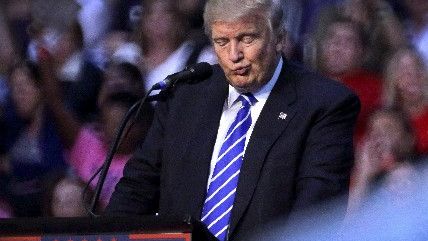Donald Trump Doesn't Understand Freedom of the Press. Neither Does Hillary Clinton.
Both Trump and Clinton want new laws to make it harder to criticize them.


This past Sunday afternoon, Republican presidential nominee Donald Trump went on a brief Twitter rant that was naturally short on specifics, but which nonetheless touched a nerve across the political spectrum because it appeared to display a jaw-dropping misunderstanding of the concept of "freedom of the press."
First, Trump complained about The New York Times, which he claims has been falsely reporting that he's been telling advisers he will "change." Then, he groused that the media doesn't "properly" cover his rallies, particularly the "size or enthusiasm," because if they were, Trump believes he would be "beating Hillary [Clinton] by 20%."
The size-obsessed Trump must not be watching the same lamestream media I am, because nearly every Trump rally for more than the past year has been covered exhaustively by both print and television media, giving the billionaire boss of frequently bankrupt businesses over $2 billion in free airtime.
After complaining about "fighting Crooked Hillary" and "the dishonest and corrupt media and her government protection process" (I don't know what that means, either), Trump dropped this doozy:
It is not "freedom of the press" when newspapers and others are allowed to say and write whatever they want even if it is completely false!
— Donald J. Trump (@realDonaldTrump) August 14, 2016
Taken with the most generous interpretation, Trump is right, "newspapers and others" can't say things that they know to be demonstrably false for the purposes of impugning someone's reputation. There are laws against libel, slander, and defamation already on the books, and a man of Trump's means would have no difficulty taking a person or organization to court if he saw fit to do so. But Trump has already gone on record in a meeting with The Washington Post editorial board earlier this year where — in his patented Trumpian non-specific brain-fart word-salad style of extemporaneous speech — he mused about "loosening up" libel laws if a paper "writes badly" about him.
That's the giveaway. Trump is less interested in prosecuting blatant falsehoods as much as he is hostile to the concept of the media "and others" saying and writing things about him that he doesn't like or agree with. In that sense, he's not too dissimilar from his electoral rival, Democratic nominee Hillary Clinton.
This past February Clinton gave a speech where she declared "you're not going to find anybody more committed to aggressive campaign finance reform than me," but — much like Trump's clumsy poker tell — Clinton tipped her hand by adding that Citizens United "was actually a case about a right-wing attack on me and my campaign."
Put another way, Citizens United was a Supreme Court case about a private organization financing a documentary critical of a leading presidential candidate during an election season, kind of like Fahrenheit 9/11, Michael Moore's slickly-produced and Disney-financed documentary timed to coincide with the 2004 presidential election to help convince the public to vote against George W. Bush.
Last month Clinton promised to push for a constitutional amendment to overturn Citizens United, which for 6 years has served as the Democrats' catchall "money corrupts everything" boogeyman. But when Clinton spoke about the need to prevent films critical of her from being produced, Slate's Mark Joseph Stern wrote (in a piece otherwise highly critical of Citizens United) that the former Secretary of State's line about an "attack on me and my campaign" was "one of the worst Clinton has ever uttered":
She essentially acknowledged that she hated the ruling because it allowed a corporation to disseminate harshly disparaging speech against her. But protection for harshly disparaging political speech is the bedrock of the First Amendment. The real problem with Citizens United was not the speech itself, but the way it was funded. By admitting that her real problem with the ruling was the content of the speech it allowed, Clinton confirmed the fears of the Citizens United majority: that a limit on corporate electioneering "uses censorship to control thought." In attempting to criticize the decision, she inadvertently proved why it might actually be right.
As my colleagues Matt Welch and Damon Root have noted, both Trump and Clinton have absolutely abominable records when it comes to free expression. And while it's always a hoot when the left and right gang up on Trump's unhinged Twitter rants about issues of constitutional import, it's worth remembering Clinton does not provide a free press-respecting alternative.
When it comes down to it, both Trump and Clinton have made it very clear they will use the power of the presidency to make it harder for an adversarial press to hold them accountable.


Show Comments (53)